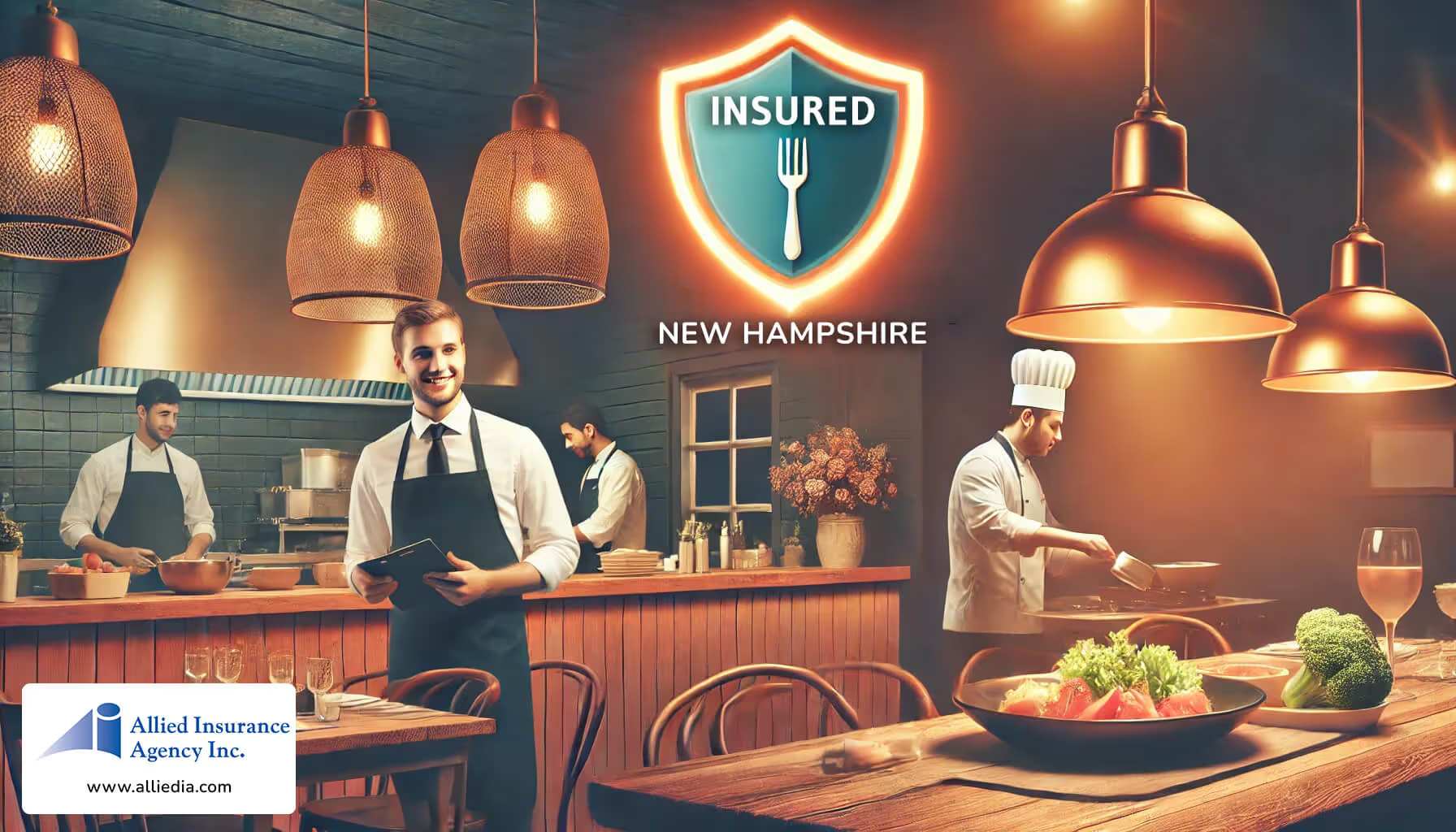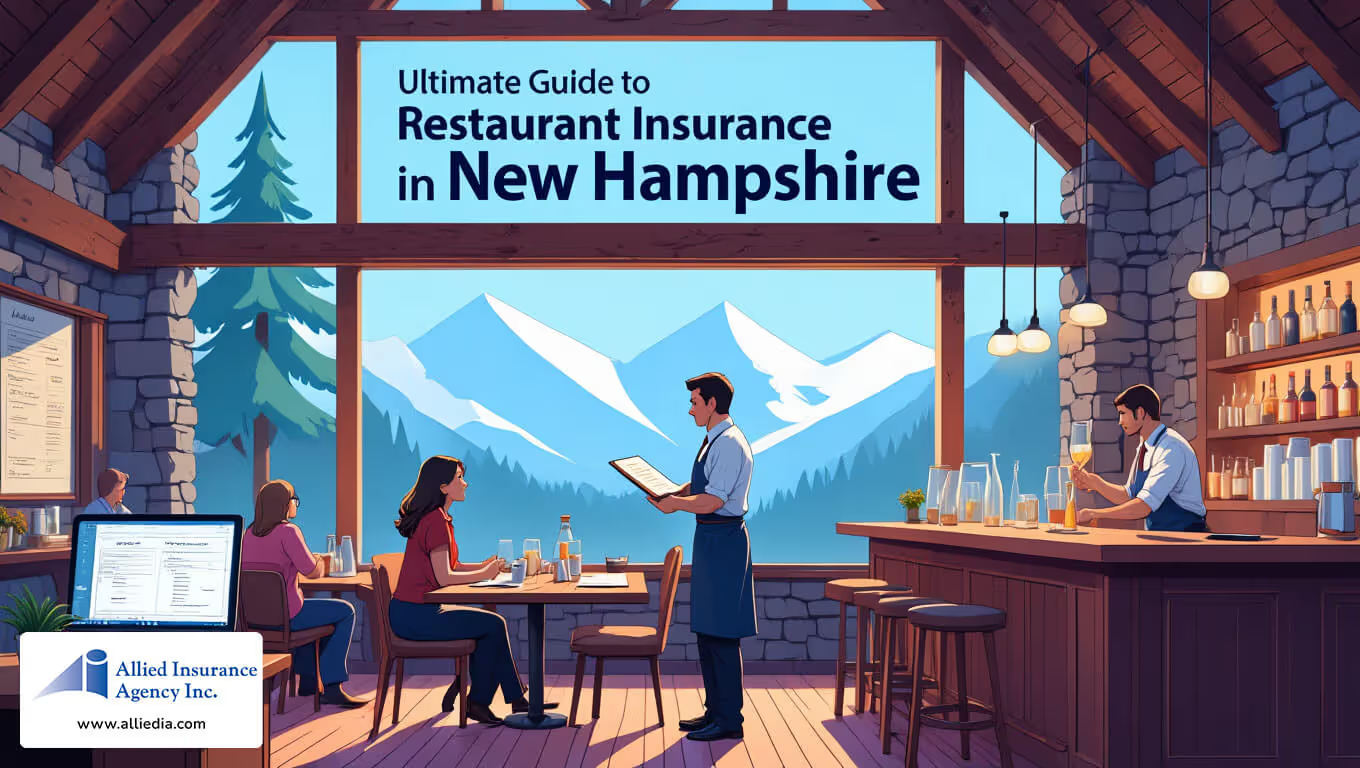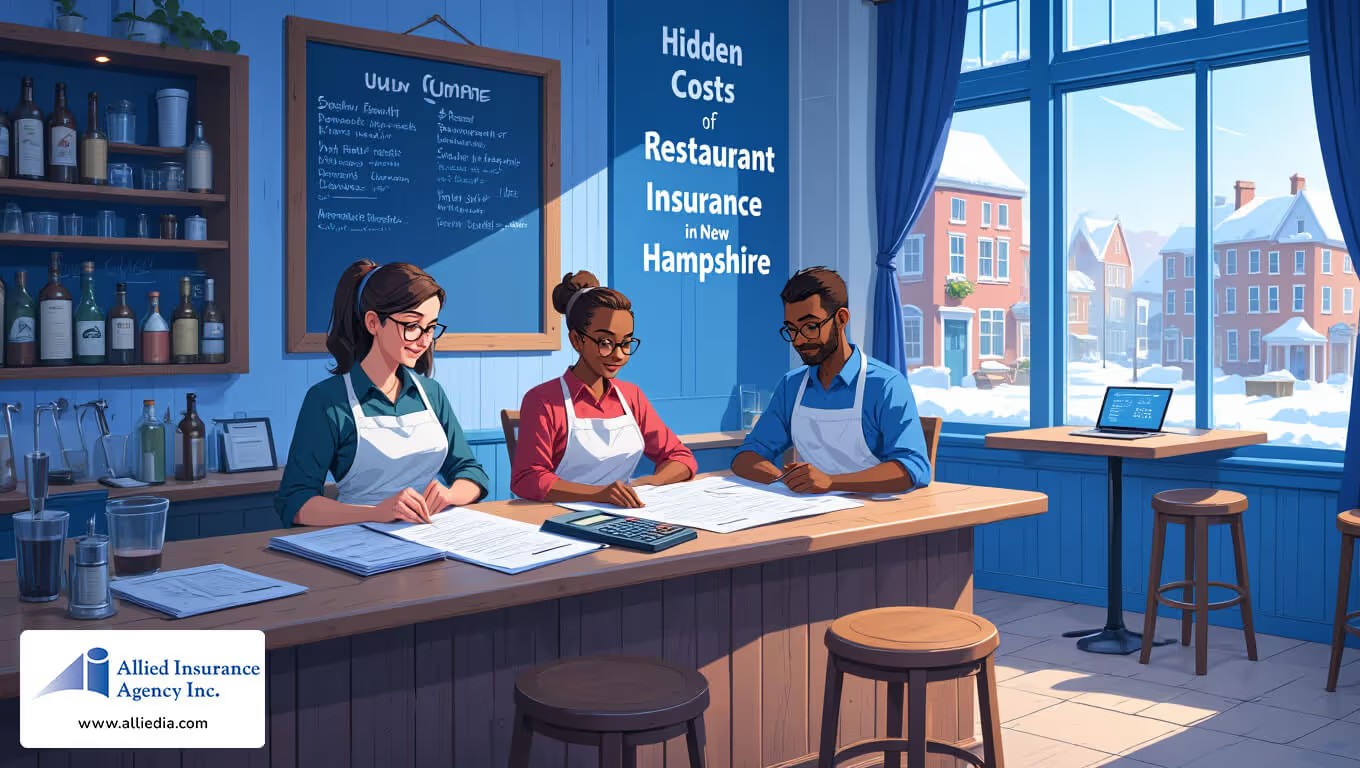
Why Most Restaurant Owners in NH Overpay for Coverage (And How to Stop)
Did you know 60% of small businesses struggle financially after unexpected incidents? Many in Concord, Bow, and Hooksett face this issue due to gaps in their protection plans. Generic policies often bundle unnecessary add-ons while missing local risks like seasonal liabilities. Contact Allied for a N.H. restaurant insurance quote to ensure your coverage addresses these potential gaps and safeguards your business.
Owners frequently assume higher premiums mean better security. However, a Concord-based eatery slashed costs by 28% after reassessing its needs. Independent agencies excel here—they compare multiple carriers and tailor plans to regional threats, from liquor liability to property damage.
Key Takeaways
- 60% of local businesses endure avoidable financial stress from inadequate plans
- Standard packages may include redundant features but skip critical protections
- Premiums don’t always reflect real risk exposure
- Independent brokers offer customized solutions through multi-carrier comparisons
- Seasonal factors in Bow and Hooksett can inflate expenses without proper adjustments
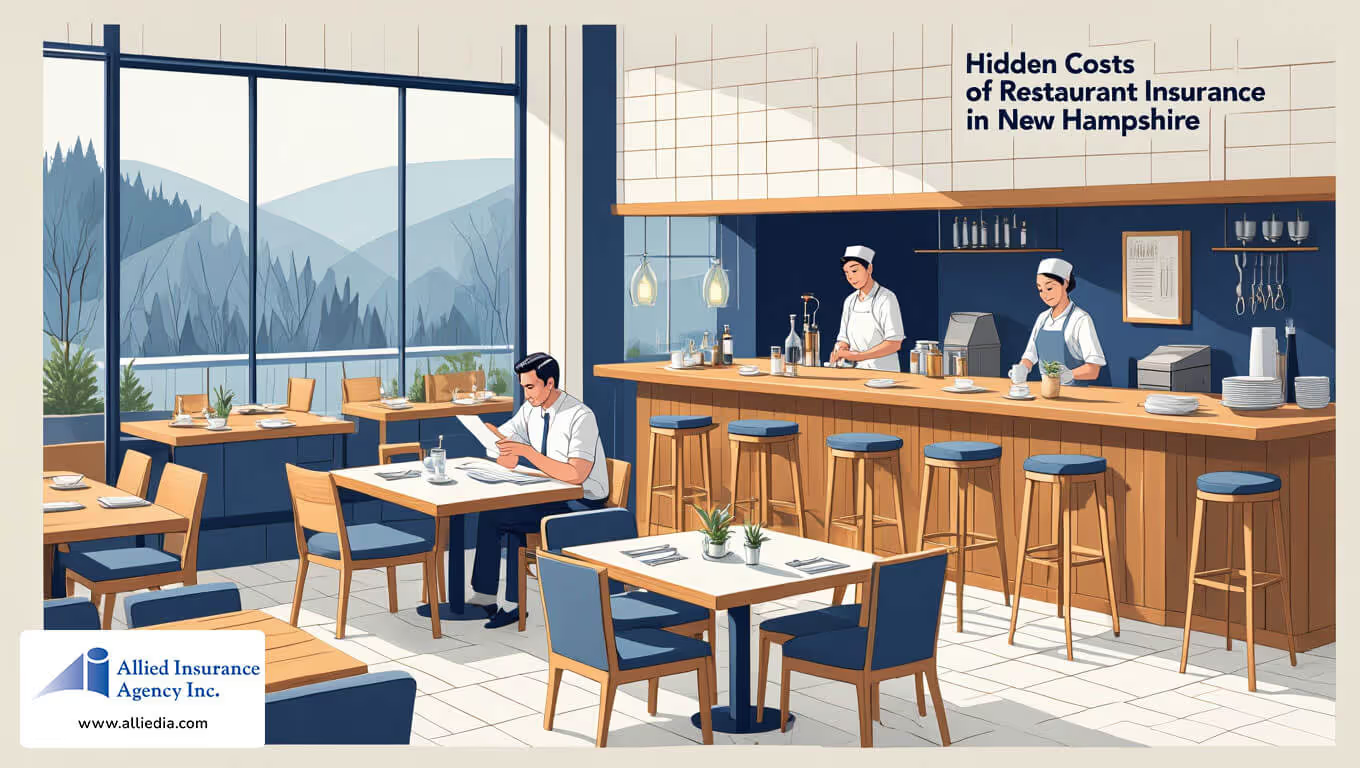
The Hidden Costs of Restaurant Insurance in New Hampshire
Many business owners unknowingly pay more than necessary for protection. Generic policies often include extra fees and overlooked gaps, especially in areas like Concord and Hooksett. Understanding these hidden expenses can help save money while maintaining strong coverage.
Common Overpayment Pitfalls
Several factors contribute to inflated premiums. Outdated property valuations in older Concord buildings lead to higher costs. Duplicate equipment coverage is another unnecessary expense many policies include. Contact Allied for a N.H. restaurant insurance quote to reassess your current policy and eliminate unnecessary expenses.
- Three-tier pricing: Some providers structure plans with bundled features that aren’t always needed.
- Employee thresholds: Adding just one worker can push a business into a higher workers’ compensation bracket.
- Urban vs. rural: Premiums in busier areas like Manchester run 19-37% higher than quieter towns.
Local Factors Driving Up Costs
New Hampshire’s unique conditions impact pricing. Hooksett’s flood zones require additional liability insurance, and seasonal tourism raises risks, leading to steeper general liability rates. Contact Allied for a N.H. restaurant insurance quote to tailor your policy according to local risk factors and avoid overpaying.
Winter weather increases equipment breakdowns, while aging infrastructure in Concord complicates property insurance claims. Kitchen fires in Bow cost 22% less to repair than in Manchester, yet premiums don’t always reflect this difference.
By recognizing these issues, owners can negotiate better terms. Independent brokers help tailor plans to actual risks, avoiding overpayment.
Finding Affordable Restaurant Insurance in New Hampshire
Business owners in Concord and Hooksett often miss opportunities to reduce expenses without sacrificing security. The right approach involves understanding essential protections and comparing options strategically.
Must-Have Elements in Budget-Friendly Plans
Cost-effective policies focus on core needs. Liquor liability should match alcohol sales volume—typically 1:5 for full-service bars. Bundling general liability with property coverage saves Concord multi-location operators up to 18%.
- Deductible flexibility: Hooksett businesses save 12-15% by choosing tiered deductibles over flat rates
- Claims response: Local insurers process claims 40% faster than national providers during peak seasons
- Menu-based adjustments: Bakeries pay 23% less than raw bars for equipment coverage
Decoding Quote Comparisons
Independent agencies like Allied Insurance highlight discrepancies in policy details. A recent analysis showed Nashua quotes included 14% more padding than Hooksett proposals for identical coverage.
Key evaluation points:
- Verify liquor liability limits match state requirements
- Check for hidden fees in equipment breakdown clauses
- Confirm weather-related deductibles reflect local risk levels
Providers may streamline the process with instant certificate access. Multi-carrier comparisons typically reveal 22% savings potential for Granite State businesses.
Essential Coverage Types for NH Restaurants
A Concord café owner learned the hard way why general liability isn’t optional. After a customer slipped on ice, their policy covered the $142k lawsuit—proof that skimping on core protections risks financial ruin. In NH, tailored plans address everything from property damage to alcohol-related incidents.
General Liability and Property Insurance
State law mandates general liability for businesses with seating. A 50-seat eatery needs at least $1 million in coverage. Property insurance, meanwhile, varies by building type. Leased spaces in Hooksett often require landlord-approved clauses, while owned properties face stricter fire-code premiums.
- Case Study: A Bow pizzeria reduced premiums by 15% after updating its kitchen safety ratings.
- Seasonal Adjustments: Winterizing equipment lowers breakdown risks in Concord’s older buildings.
Liquor Liability and Workers’ Compensation
NH classifies alcohol servers differently. Wineries pay lower rates than brewpubs due to lower intoxication risks. Workers’ comp costs hinge on payroll size and safety records. Seasonal staff spikes in tourist towns like North Conway trigger tiered pricing.
- Verify liquor liability limits match your alcohol sales volume (e.g., 1:5 ratio for full bars).
- Audit payroll records annually—misclassified employees inflate premiums.
Southern NH Premium Comparison (Annual)
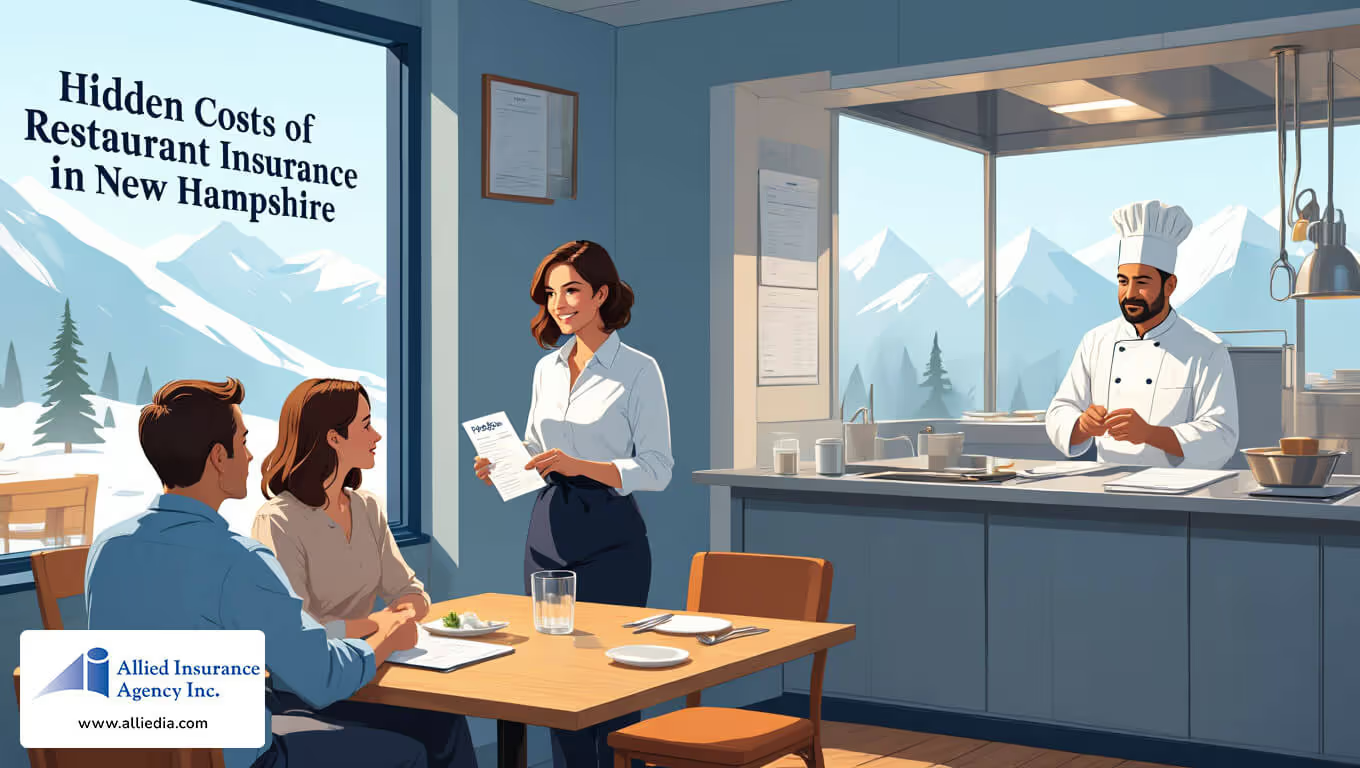
Localized Risks for Bow, Concord, and Hooksett Eateries
Bow, Concord, and Hooksett eateries face unique challenges that demand tailored protection. These communities require policies addressing hyper-local threats, from seasonal tourism spikes to aging infrastructure.
Seasonal Tourism and Weather Challenges
Concord’s tourist density peaks in summer and fall, increasing slip-and-fall liabilities by 34%. Basement kitchens in Bow’s flood zones face higher premiums—up to $2,100 annually for water damage endorsements.
Winter brings power outages. A Hooksett gastropub recovered $18k after a nor’easter spoiled its inventory. Policies with food contamination riders typically cover 80% of such losses.
Equipment Breakdowns and Food Spoilage
HVAC failures occur three times more often in Hooksett’s pre-1980 buildings. Older wiring increases fire risks, impacting property insurance costs. Menu storage matters, too—rawa seafood vendors pay 27% more for spoilage coverage than bakeries.
- Staffing swings: White Mountain tourism businesses need adjustable workers’ compensation for seasonal hires.
- Preventive savings: Winterizing equipment cuts breakdown claims by 40% in Concord.
Why Liquor Liability Insurance is Non-Negotiable
New Hampshire bars and eateries face a 23% higher risk of liquor-related claims than the national average. Without proper safeguards, one overserved patron can lead to crippling lawsuits. Tailored liquor liability coverage is the only way to mitigate these financial threats.
Case Study: The $110k Overserving Lawsuit
A Manchester bar faced a $110k lawsuit after an intoxicated patron caused a car accident. Their policy covered defense costs, but similar claims often exceed six figures. NH’s dram shop laws hold businesses accountable for overserving—even if the patron left the premises.
Matching Coverage to Alcohol Sales
Coverage needs vary by establishment type. Full-service bars typically require a 1:5 ratio of alcohol sales to liability limits. After implementing server training programs, a Concord wine bar slashed premiums by 18%.
- Breweries vs. Restaurants: Beer gardens need lower limits than nightclubs with hard liquor service.
- NH’s Unique Laws: "Host liquor" policies differ from "permit holder" requirements.
- Seasonal Adjustments: Tourist-heavy areas like North Conway may need temporary coverage boosts.
Workers’ Compensation: Compliance and Protection
Every business with employees in the state must prioritize workplace safety and financial safeguards. Workers' compensation isn’t just a legal requirement—it’s a critical shield against unexpected costs from injuries or accidents.
Understanding NH’s Legal Requirements
State law mandates coverage for all businesses with one or more employees. Penalties for non-compliance can escalate quickly:
- Daily fines: Up to $100 per employee for each day without coverage
- Initial penalties: $2,500 for failing to obtain proper compensation plans
- Reporting violations: $50 daily fines for missing injury documentation
Exemptions exist for sole proprietors and small LLCs with no additional staff. However, most eateries and hospitality businesses need full protection. Allied Insurance Agency in Bow, NH, offers specialized plans meeting these regulations.
Reducing Kitchen Risks and Claims
Restaurant environments present unique hazards. Burn injuries account for 38% of all food service claims statewide. A Concord steakhouse cut incidents by 42% after installing ergonomic equipment and anti-slip flooring.
Proactive measures lower premiums:
- Implement staff safety training programs (15-20% discount potential)
- Maintain detailed injury logs for experience modification factors
- Choose tiered deductibles based on payroll fluctuations
Bow kitchens with certified safety protocols see 27% lower compensation costs than uncertified counterparts. Proper coverage ensures both compliance and financial stability when accidents occur.
Commercial Property Coverage for NH Restaurants
Protecting physical assets is just as crucial as managing liability risks for local businesses. Fires, theft, and vandalism can devastate operations, especially in high-traffic areas like Concord or Hooksett. Tailored commercial property plans address these threats while accounting for regional factors.
Protecting Against Fire, Theft, and Vandalism
Hooksett’s commercial crime rates are 22% higher than those of rural towns. A café there recovered $14k after a break-in, thanks to property insurance with vandalism riders. Fire risks vary, too—deep fryer-heavy menus increase premiums by 18%.
Historic Bow buildings cost 37% more to rebuild than modern structures. Winter closures also trigger "loss of use" claims. A Concord bistro recouped 80% of lost income during a 3-week shutdown.
Leased vs. Owned Property Considerations
Leased spaces require tenants to secure "betterment coverage" for renovations. Landlords often mandate $500k+ in coverage for shared buildings. Owned properties face stricter codes—updated electrical systems cut fire premiums by 15%.
- Crime hotspots: Manchester’s downtown sees 2x more theft claims than Bow.
- Menu impacts: Bakeries pay lower rates than grills for fire protection.
- Winter prep: Insulating pipes reduces freeze-related claims by 40%.
Beyond Basics: Additional Coverage for Peace of Mind
Most Granite State businesses overlook two critical safeguards that prevent financial disasters. While general liability and property coverage handle common risks, specialized plans address gaps like theft or spoilage. These add-ons prove invaluable when unexpected strikes.
Crime Insurance and Employee Theft Protection
Local eateries face employee theft rates 18% higher than the national average. A Concord seafood market recovered $32k after an inventory loss, thanks to crime coverage. Policies typically include:
- Cash theft protection during deposits
- Fraudulent transaction reimbursement
- Third-party vandalism claims
Preventive measures like inventory audits cut premiums by 12%. Hooksett’s power grid instability further heightens the need for spoilage riders.
Business Interruption and Food Contamination
NH Health Dept. mandates closure coverage for contamination incidents. A single nor’easter cost a Bow bistro $18k in spoiled stock—80% covered by their policy. Key considerations:
- Seasonal businesses need adjustable business interruption terms
- Cyber insurance for online orders reduces fraud risks
- Training protocols lower contamination claim frequency
Tailored plans turn potential disasters into manageable setbacks. Independent brokers help match protections to real-world threats.
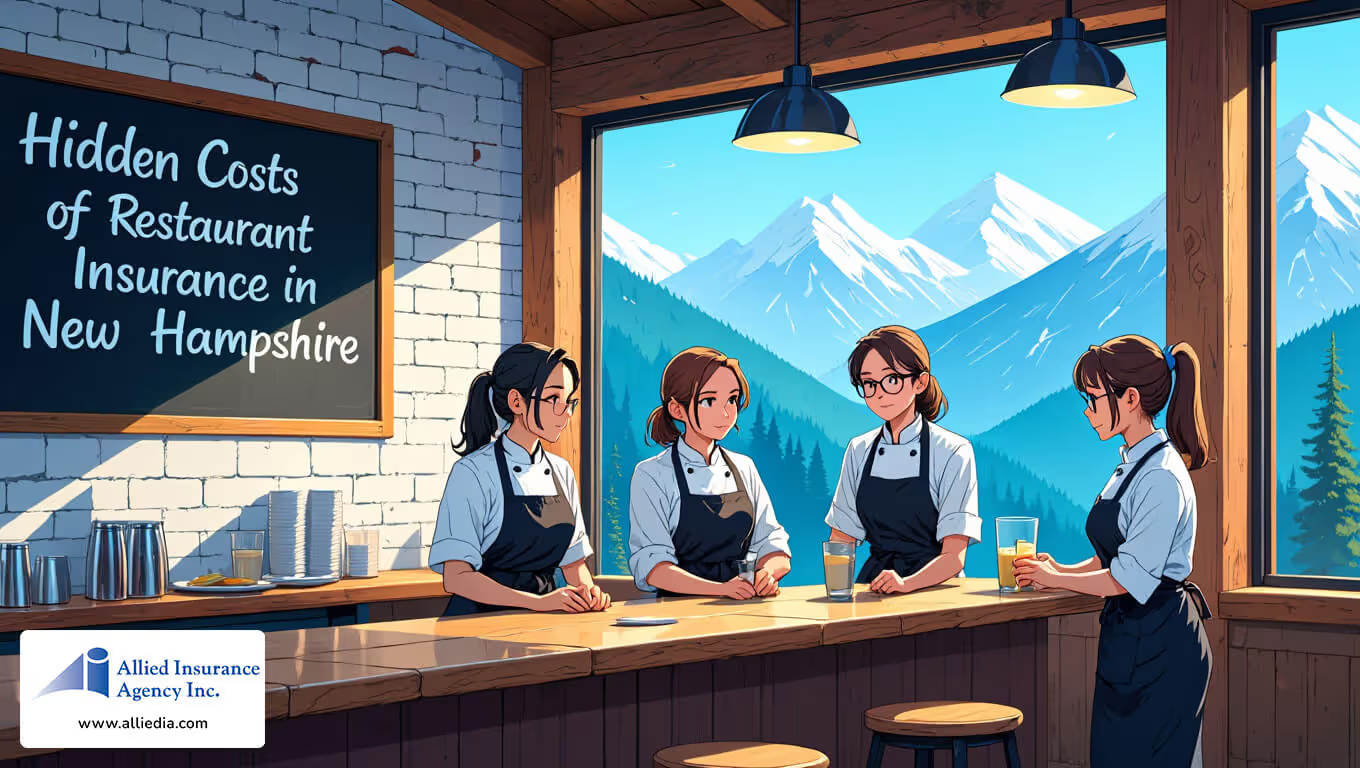
How Independent Agencies Save You Money
Working with local experts unlocks hidden savings most businesses never find. Independent agencies specialize in navigating complex policies to match real needs with the right protection.
The Advantage of Multi-Carrier Comparisons
Unlike single-provider options, independent firms analyze offers from multiple carriers. A Hooksett diner saved $8,400 annually after their agent identified redundant coverage in their plan.
Key benefits include:
- 22% average savings through competitive rate comparisons
- Access to regional carriers with NH-specific endorsements
- Faster claims processing through local adjuster networks
Customized Policies for Unique Needs
Granite State businesses face distinct challenges. Independent agents tailor solutions like:
- Seasonal staffing adjustments for tourist areas
- Flood zone riders for Hooksett properties
- Menu-based equipment coverage discounts
A Concord restaurant cluster saw premiums drop 17% over three years through continuous policy reviews. Local experts spot trends national providers miss.
Pro tip: Annual coverage audits prevent overpayment while maintaining essential protections. Independent agencies provide checklists to simplify this process.
Conclusion: Secure Your Restaurant’s Future Today
Granite State business owners can act now to lock in protection before seasonal risks escalate. Independent agents in Concord, Bow, and Hooksett help tailor coverage to local needs, such as winterizing policies or adjusting liquor liability limits.
Time-sensitive steps:
- Request a free policy audit before autumn premium hikes
- Compare quotes from providers like NEXT for instant certificates
- Update weather-related deductibles by October 15
A recent case shows how proactive reviews matter. A Hooksett brewery saved 22% by bundling policies ahead of tourist season. Don’t wait until claims happen—local experts at Allied Insurance offer same-day quotes.
Act today to secure your business against New Hampshire’s unique risks. Contact Allied for a N.H. restaurant insurance quote today to explore customized coverage options that fit your specific needs.

